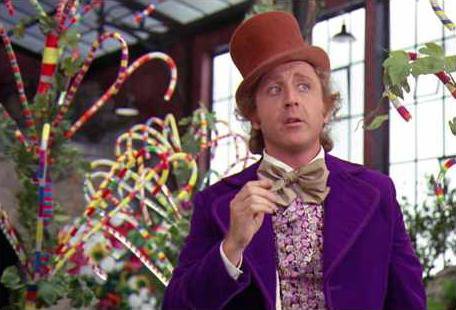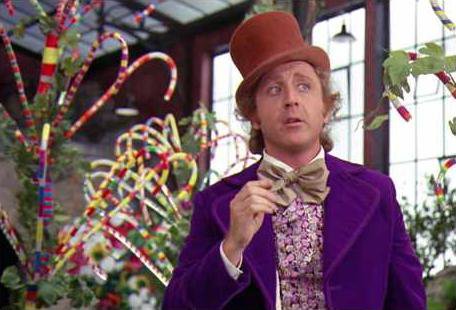It was love at first sight.
On a Friday night in 1968, I drove into Los Angeles looking for the out-of-the-way theater that was playing a little movie called The Producers.
I had been a Mel Brooks fan since 1961 from his guest appearances on TV shows and his comedy records with Carl Reiner, highlighted by Brooks 2,000-Year-Old Man character.
So when I read in the Los Angeles Times that Brooks had written and directed a movie a comedy about a Broadway producers investment scam that involves mounting the worst musical ever so it will deliberately flop the film immediately rose to the top of my must-see list.
As a first-time filmmaker, Brooks direction was all over the place, but the script he wrote was a riot and the casting was perfect. And as I watched, I fell in love with this actor Id never seen before: Gene Wilder.
In The Producers, Wilder was this sleepy-eyed, high-strung, nervous, nebbish accountant contrasted with his co-star, the bug-eyed Zero Mostel, bombastic and over-the-top as a conniving Broadway producer. And it was comedy genius.
I laughed long and loud at Wilders hilarious antics. I even began quoting lines from the film (Im in pain and Im wet and Im still hysterical), even though no one else in my sphere had seen it.
And in fact, years later as I remembered The Producers and chuckled to myself even after Brooks' and Wilders one-two punch of Blazing Saddles and Young Frankenstein in 1974 I still hadnt met anyone who had seen The Producers. Or even heard of it.
All of these memories came flooding back on Monday with the news of Wilders death at age 83. It was like losing an old friend with whom Id lost contact.
Despite Wilder earning an Academy Award nomination for his role in The Producers and Brooks winning an Oscar for the screenplay, the film flopped (ironic, considering the subject matter) until it later earned cult status in art-house and college-campus revivals.
Six years later, Young Frankenstein was based on Wilders story idea, and he and Brooks wrote the screenplay together, lampooning the 1930s Frankenstein franchise. The result is unquestionably their best-remembered picture, loaded with comic dialogue that fans still quote back and forth to each other (Pardon me, boy, is this the Transylvania station? Ya, ya, track 29; Oh, can I give you a shine?)
Outside of his work with Brooks, Wilders most enduring movie is probably Willy Wonka and the Chocolate Factory, which didnt fare particularly well in theaters when it opened in 1971 but really gained traction in the 1980s on home video.
Wilder later had success with a pair of films that partnered him with Richard Pryor: the Hitchcock spoof Silver Streak (1976) and the prison comedy Stir Crazy (1980), both of which landed among the top five box-office hits of their respective years.
Wilders output was not prolific: By the time his last theatrical film was released in 1991, he had made just 22 films in the 24 years since his debut in a small supporting role in Bonnie and Clyde (1967). He also co-starred with Donald Sutherland in the French period farce Start the Revolution Without Me (1970); he was the Fox in a live-action adaptation of The Little Prince (1974); he was again paired with Zero Mostel in Rhinoceros (1974); and he played a Polish rabbi in a Western with Harrison Ford, The Frisco Kid (1979).
His later films were very hit and miss, and too often they missed, including four that Wilder wrote, directed and starred in: The Adventure of Sherlock Holmes Smarter Brother (1975), The Worlds Greatest Lover (1977), The Woman in Red (1984) and Haunted Honeymoon (1986), as well as two more with Pryor, See No Evil, Hear No Evil (1989) and Another You (1991).
But even when his later films were met with derision from critics, the reviews often spoke fondly of Wilder.
His big-screen persona was not just one of manic incredulity and overwhelming anxiety but also of warmth. His characters might seem a little addled but they nonetheless had an inviting, endearing quality. And even the most cynical critics seemed to yearn for more of that.
Wilder often said he didnt consider himself a comedian but rather an actor who could be funny playing an everyman in scripted films.
Lots of movie stars are able to reflect the common man onscreen and give the audience something with which to identify, but Wilder had the ability to engender something more, something that immediately put you on his side.
His characters were easy to love, something thats not easy to project.
On a Friday night in 1968, I drove into Los Angeles looking for the out-of-the-way theater that was playing a little movie called The Producers.
I had been a Mel Brooks fan since 1961 from his guest appearances on TV shows and his comedy records with Carl Reiner, highlighted by Brooks 2,000-Year-Old Man character.
So when I read in the Los Angeles Times that Brooks had written and directed a movie a comedy about a Broadway producers investment scam that involves mounting the worst musical ever so it will deliberately flop the film immediately rose to the top of my must-see list.
As a first-time filmmaker, Brooks direction was all over the place, but the script he wrote was a riot and the casting was perfect. And as I watched, I fell in love with this actor Id never seen before: Gene Wilder.
In The Producers, Wilder was this sleepy-eyed, high-strung, nervous, nebbish accountant contrasted with his co-star, the bug-eyed Zero Mostel, bombastic and over-the-top as a conniving Broadway producer. And it was comedy genius.
I laughed long and loud at Wilders hilarious antics. I even began quoting lines from the film (Im in pain and Im wet and Im still hysterical), even though no one else in my sphere had seen it.
And in fact, years later as I remembered The Producers and chuckled to myself even after Brooks' and Wilders one-two punch of Blazing Saddles and Young Frankenstein in 1974 I still hadnt met anyone who had seen The Producers. Or even heard of it.
All of these memories came flooding back on Monday with the news of Wilders death at age 83. It was like losing an old friend with whom Id lost contact.
Despite Wilder earning an Academy Award nomination for his role in The Producers and Brooks winning an Oscar for the screenplay, the film flopped (ironic, considering the subject matter) until it later earned cult status in art-house and college-campus revivals.
Six years later, Young Frankenstein was based on Wilders story idea, and he and Brooks wrote the screenplay together, lampooning the 1930s Frankenstein franchise. The result is unquestionably their best-remembered picture, loaded with comic dialogue that fans still quote back and forth to each other (Pardon me, boy, is this the Transylvania station? Ya, ya, track 29; Oh, can I give you a shine?)
Outside of his work with Brooks, Wilders most enduring movie is probably Willy Wonka and the Chocolate Factory, which didnt fare particularly well in theaters when it opened in 1971 but really gained traction in the 1980s on home video.
Wilder later had success with a pair of films that partnered him with Richard Pryor: the Hitchcock spoof Silver Streak (1976) and the prison comedy Stir Crazy (1980), both of which landed among the top five box-office hits of their respective years.
Wilders output was not prolific: By the time his last theatrical film was released in 1991, he had made just 22 films in the 24 years since his debut in a small supporting role in Bonnie and Clyde (1967). He also co-starred with Donald Sutherland in the French period farce Start the Revolution Without Me (1970); he was the Fox in a live-action adaptation of The Little Prince (1974); he was again paired with Zero Mostel in Rhinoceros (1974); and he played a Polish rabbi in a Western with Harrison Ford, The Frisco Kid (1979).
His later films were very hit and miss, and too often they missed, including four that Wilder wrote, directed and starred in: The Adventure of Sherlock Holmes Smarter Brother (1975), The Worlds Greatest Lover (1977), The Woman in Red (1984) and Haunted Honeymoon (1986), as well as two more with Pryor, See No Evil, Hear No Evil (1989) and Another You (1991).
But even when his later films were met with derision from critics, the reviews often spoke fondly of Wilder.
His big-screen persona was not just one of manic incredulity and overwhelming anxiety but also of warmth. His characters might seem a little addled but they nonetheless had an inviting, endearing quality. And even the most cynical critics seemed to yearn for more of that.
Wilder often said he didnt consider himself a comedian but rather an actor who could be funny playing an everyman in scripted films.
Lots of movie stars are able to reflect the common man onscreen and give the audience something with which to identify, but Wilder had the ability to engender something more, something that immediately put you on his side.
His characters were easy to love, something thats not easy to project.





